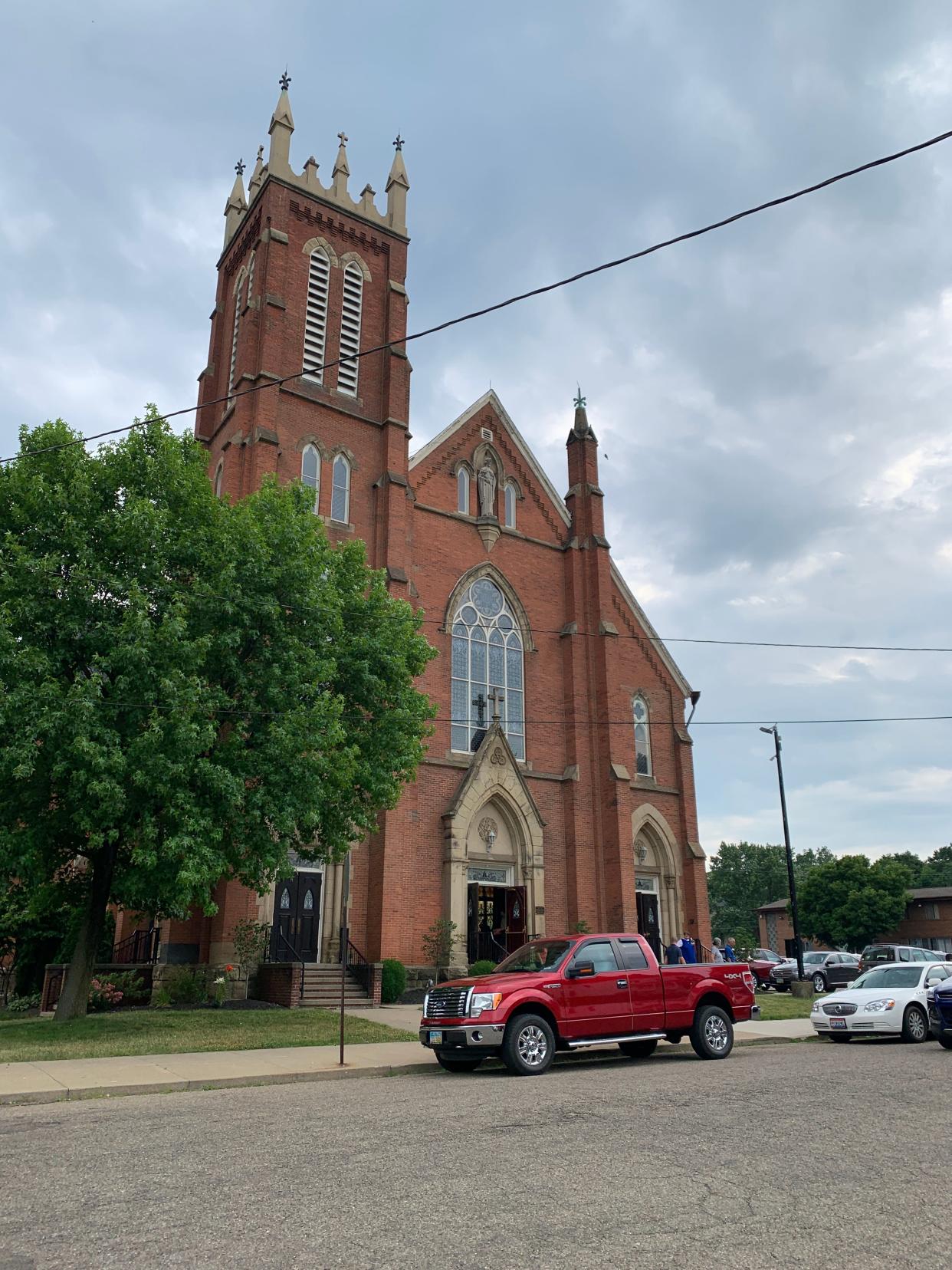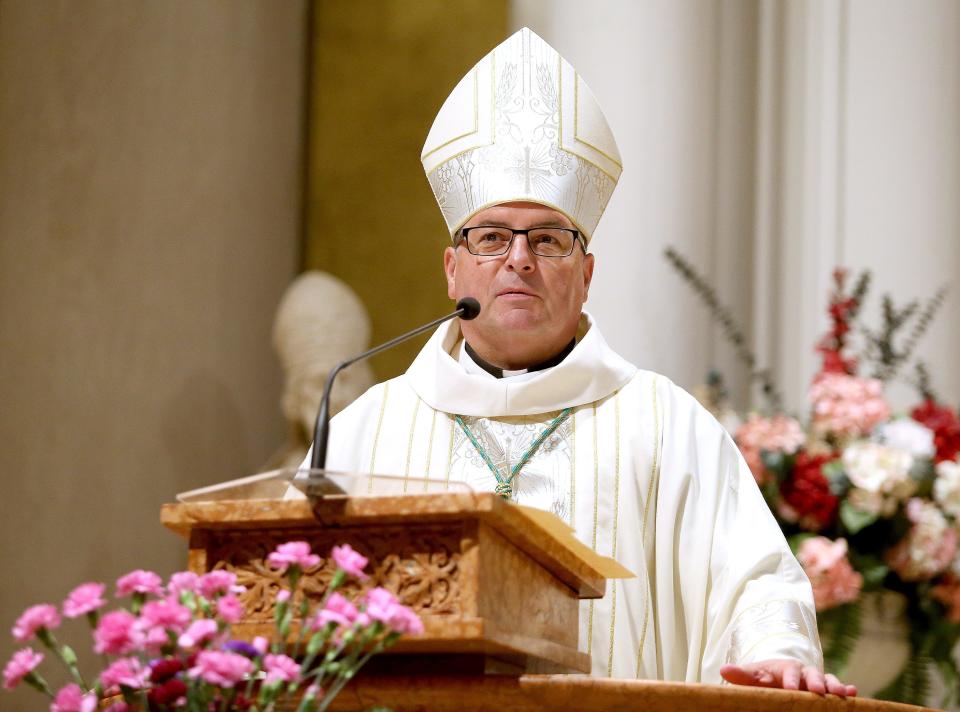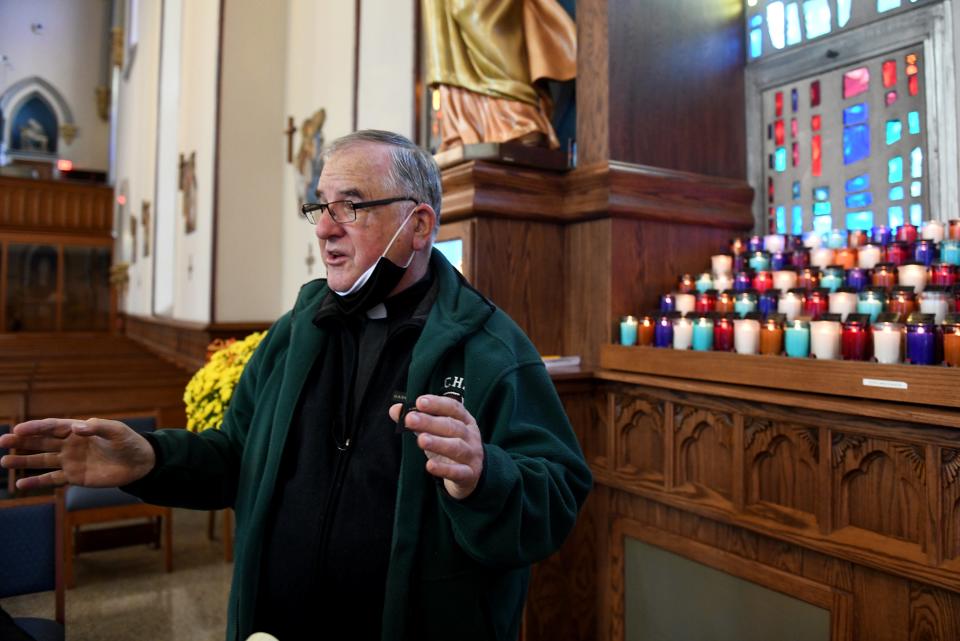Massillon Catholic churches to cut Mass times, reconfigure priestly duties

- Oops!Something went wrong.Please try again later.
MASSILLON – Area Catholics may soon have to modify their spiritual schedules.
Starting Saturday, St. Barbara, St. Mary's and St. Joseph Catholic churches each plan to eliminate two of their scheduled weekend Masses.
As a result, a 4 p.m. Saturday Mass will be held at St. Joseph; and on Sundays, St. Mary's will to host an 8 a.m. Mass and St. Barbara will host an 11 a.m. Mass.
The changes come as the Catholic Diocese of Youngstown continues efforts to respond to a decline in available priests within the diocese. Two longstanding priests — the Rev. Raymond Paul of St. Joseph and the Rev. Edward Gretchko of St. Mary's — are scheduled to retire at the end of June. A third priest, the Rev. Brian Cline of St. Barbara, has relocated to Saint Joan of Arc in Canton.
The Very Rev. Dr. Canon Maciej M. Mankowski, who has served at churches within the Diocese of Youngstown for 21 years, is scheduled to replace Paul, Gretchko and Cline.
Gretchko, who has served at St. Mary's for 24 years, said he's trying to make sure his congregation knows that the Mass time changes are a positive move for the parishes.
"I'm trying to give them a pound of hope and a pound of joy that the church goes on," Gretchko said. "People resist change sometimes, but it's also inevitable."
More: St. Barbara Catholic School closes; low enrollment, loss of faculty and debt risk cited
Declining participation in Mass spurs innovation
In 2019, the late Most Rev. George Murry, former Bishop of the Diocese of Youngstown, created a "pastoral plan" to take advantage of the challenges and opportunities facing its churches, which are located throughout Ashtabula, Columbiana, Mahoning, Portage, Stark and Trumbull counties.
In a letter outlining the plan, Murry cited multiple priests nearing retirement age and the "alarming trend of fewer people identifying as Catholics" as barriers for the diocese to overcome.
Justin Huyck, coordinator of media relations at the Diocese of Youngstown, said nine priests are retiring from the diocese this year while only one is being ordained. Canon law, the law of the Catholic Church, allows priests to request retirement when they turn 70 years old. Once they turn 75, priests are required to request to retire, but that request can either be approved or denied year to year by a bishop.
In 2022, the Most Rev. David Bonnar, bishop of the Diocese of Youngstown who is carrying out Murry's 2019 plan, approved the mandatory retirement requests of Paul, 86, and Gretchko, 78, both of whom have had their retirements delayed a number of years.

To overcome declining numbers of parishioners at Masses, the pastoral plan placed parishes with close proximity to each other in pastoral regions to consolidate many Masses with low attendance into fewer Masses with high attendance. According to the plan, St. Barbara, St. Mary's and St. Joseph are part of the Stark West region, along with St. Philip and James in Canal Fulton and Holy Family in Navarre.
The plan estimated that average attendance per Mass would increase from 174 in 2019 to 218 after the plan's implementation. Additionally, the number of average parishioners per priest is estimated to increase by more than 600 people, from 1,794 in 2019 to 2,423.
Huyck said those estimates are subject to change as the diocese considers finances, priest retirements, COVID-19 and other factors.
A survey of young Catholics ages 18 to 35 released last year by the Center for Applied Research in the Apostolate reported that 73% agreed "somewhat" or "strongly" that they could be a good Catholic without attending weekly Mass.
'If you don't move forward, you become stagnant.'
With Mass times and locations being cut, parishioners, along with Gretchko, Paul and Mankowski, have mixed feelings on the changes.
Gretchko said he is open to God's will following his retirement. He plans to help out at other churches whenever he can.
He also said he views change as a positive thing and, given the existence of other problems in the world, retirement doesn't seem so bad to him.

Paul, who has been a priest at St. Joseph for 36 years, said he was more hesitant to come to terms with his retirement because he felt concerned about the possibility of the Catholic Church losing members as a result of the changes.
Parishioners have routines for which times they prefer to go to Mass, which ultimately makes it easier for them to continue attending church, he said. Now that the Mass times are being moved around, he fears declining participation in Catholicism will be made worse.
Cynthia Giltz, a parishioner at St. Barbara and chairwoman of the parish council there, empathized with Paul, though like Gretchko, she recognized that the changes would need to be implemented eventually.
"If you don't move forward, you become stagnant, and unfortunately, we don't have a lot of priests and we don't have priests being ordained," Giltz said. "This is something that we've seen coming for a number of years. It's just here now, and we have to embrace it and make the best of it."
One of Mankowski's central objectives, he said, is convincing apprehensive parishioners that the changes will be positive for the continuation of the parishes. The priest shortages within the diocese pose a serious threat to peoples' abilities to worship, he said.
"In the next few years — and I'm not even talking about five years, I think it's going to be even sooner than that — we're going to face a very serious crisis, and that's why this plan has to be implemented right now," Mankowski said.
Despite his excitement to begin working with new parishes, Mankowski said he's slightly concerned about getting burnt out. He knows what's ahead of him, he said, and he plans to make the Masses the most viable they can be.
Contact Ryan via email at rmaxin@gannett.com, on Twitter at @ryanmaxin or by phone at 330-580-8412.
This article originally appeared on The Repository: Massillon Catholic churches are cutting Mass times

